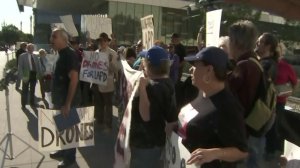Activists continued voicing their opposition to an LAPD plan to use drones by protesting at a Los Angeles City Council committee meeting where funding for the program was approved Wednesday morning.
The Public Safety Committee approved a $31,500 donation from the Los Angeles Police Foundation for the purchase of four civilian-level drones. The full City Council must vote on the donation before LAPD can use the drones.
Activists with the Stop LAPD Spying Coalition say the police drone use will infringe on people’s privacy. They are also worried it further militarizes the Los Angeles Police Department.

“To normalize drones, which are going to be taking over the sky in swarms, if you normalize them right now — that’s what’s going to happen in the future. Don’t laugh at that,” one activist told the committee.
The coalition’s Jamie Garcia said the group has gathered more than 5,500 signatures on an anti-drone petition, and has held several town halls.
“People have completely rejected the drones,” Garcia said.
LAPD Assistant Police Chief Beatrice Girmala told the committee the drones will help protect the lives of officers and K-9 units.
“If we have the opportunity to put a mechanical item in harm’s way – rather than someone who’s breathing and functioning as a human being, or as an animal – I say that it’s a worthy cause for us to support,” Girmala said.
Councilman Joe Buscaino, a former LAPD officer, said he thinks the technology will be used “wisely.”
The drones would not be equipped with weapons or facial recognition systems, authorities say.
The drones would be used in natural disasters, search and rescue operations, and tactical situations such as active shooter or barricaded suspect scenarios, according to the pilot program’s guidelines. And a high-ranking officer would need to approve drone deployment at each scene.
A one-year pilot program to use the drones was approved by the Police Commission in October despite concerns voiced by some in the public.
The City Council will vote to on the funding for the drone program on Feb. 14.




















